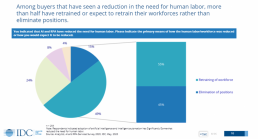People are difficult. Well assembling, marshaling, and motivating people is certainly harder than doing the same for technology. It is also true that the most important capability we have is the quality and commitment of the talent we employ. “It makes the difference” we hear again and again.
But we live in a resource-constrained world. Skills are getting rarer, and shortages are appearing. There is an alternative to paying more for the skills you need on the open market: reskilling. We are going to examine if this is a good option and why, or why not?
Skills shortage – what skills shortage?
There is a famous meme that some roles that will be vital in the next 5 years don’t exist yet. To be fair I think that is probably true. I have recently come across the role of AI Explicability Officer. I can imagine the need for cloud migration may well spawn a role of its own: Cloud Wrangler I call it.
Our analysts in IDC’s European Skills practice have determined that even just focusing on existing tech roles there will be a demand for an extra 1.15 million new people in the next four years. Already 50% of organisations are saying that projects are being delayed because of lack of skills. We estimate this by 2025 this will be costing European companies $229 billion annually. What is it costing you?
Right, you might say, but rising levels of unemployment due to the pandemic will sort that out. Unfortunately, under-employment does not mean that the problem goes away. Typically, lasting unemployment will match the skills that are no longer needed. Key technical skills tend to be in demand and get snapped up quickly.
What skills do you need?
According to a recent study, the question “What are the most critical skills your organization needs over the next 2-3 years?” Outperforming companies emphasize industry-specific skills 79% more than Underperformers. This was followed by technical skills as the second priority. So you probably need industry and tech skills.
Only you, as a digital leader, can say what skills will be critical going forward. Our research shows what is in demand generally but you know if you need leading-edge technical skills. How you manage your technical debt feeds into this and indeed sweating your assets can be measured in terms of skill costs.
What is true is that you need a plan. Determining the skills needed for the next 2-5 years should be done with an eye on what it is going to cost you as shortages bite. And with a strong linkage into the strategic plan of your business going forward. You need to be one step ahead on how you have the skills needed to enable the strategy.
So, given that you need industry and even organisational skills as a high priority maybe the answer is not to find more people from outside. Maybe it is about reskilling the people internally?
Reskilling – does it work?
Technology can certainly change the profile of talent needed. Sometimes this results in the elimination of positions (and a saving in headcount) but that is not always the case. Technologies such as RPA are causing human labour needs to decrease dramatically. This does not always result in eliminated positions. AI/ML is a good example:
But does that apply to IT skills? I believe you must think about “adjacent skills”. Database Administrators are very highly paid specialists, but the job is being simplified and automated. Their skills in terms of understanding data in your organisation might put them in a good position in the growing AI team that you can’t recruit for.
The cost of reskilling comes down to choosing wisely + training and good leadership. This can be balanced against the cost of redundancy and hiring in a bear market.
The factors that you really need to consider should be quality, timeliness, and attractiveness. No, not that sort of attractiveness. Rather, how attractive the role in your company is, or isn’t, to external hires and, conversely how attractive your newly minted AI data specialist will be in the market.
Alternatives approaches
An oft suggested alternative to reskilling is outsourcing; which is ok if you have deep pockets and don’t want to keep the skills in the long term.
Or offshoring; finding skills in remote corners of the world. It is true that the Pandemic and working from home means more mobility in the tech labour market. But it does not mean that there are many hidden treasure troves of rare skills waiting for you to find them. 20 years ago India having more grade A graduates than the USA had graduates was news. That sort of arbitrage is mostly over.
In conclusion: is reskilling something I should consider?
Probably you should if your assessment of your business/tech roadmap shows a divergence from the tech talent you can count on. Do you know what you will need in 2-5 years? Do you know what the hiring market will be like? Definitely, you should consider your next steps right away; as time is against you.
Next step
If this article has raised questions for you but you want to talk about it with peers we can help you with that. Free of charge. The only requirement is that you are a peer to the rest of the community i.e. that you are a Digital Leader (CIO equivalent at a European company). The IDC European Digital Leadership Community is gathering on the 1st of April in the afternoon to discuss all aspects of:
“Keeping your Tech Talent Ready for the Future Enterprise”
Would you like to have your say? Come and join knowledgeable professionals and IDC subject matter experts for what promises to be a great session? There is no charge and we meet on different topics every two weeks. You can sign up at: https://www.linkedin.com/groups/8992748/ or email me at mdowd@idc.com



